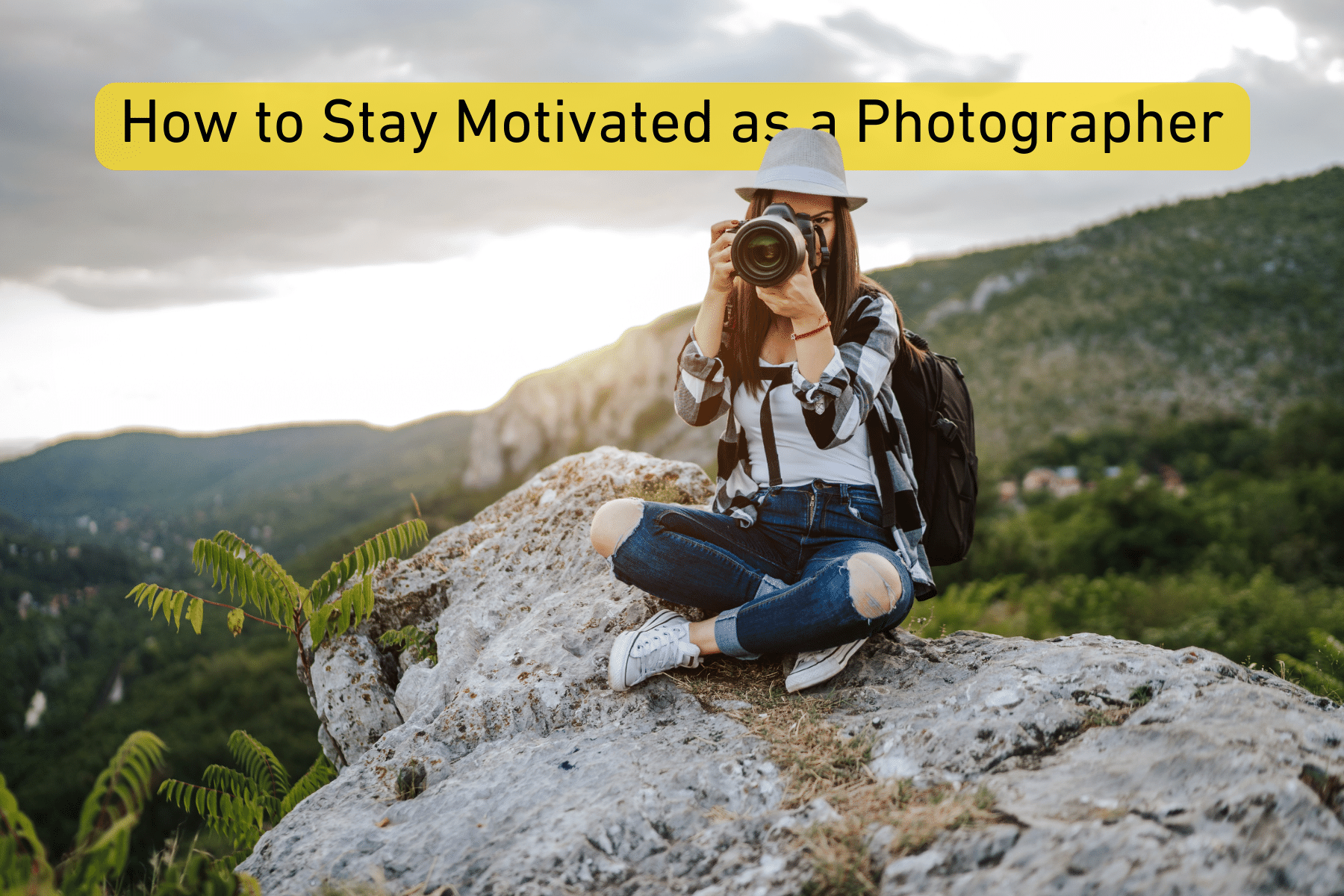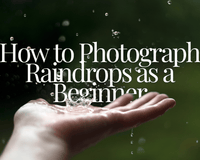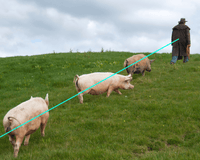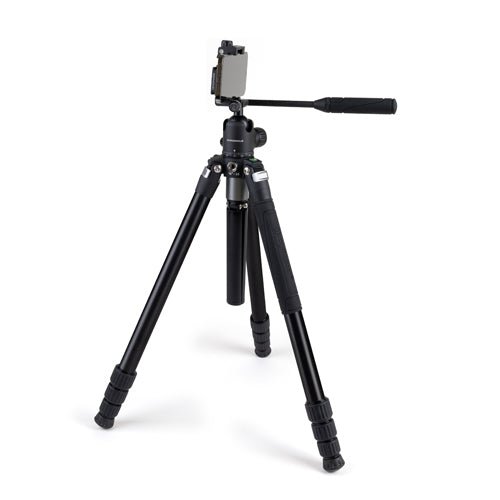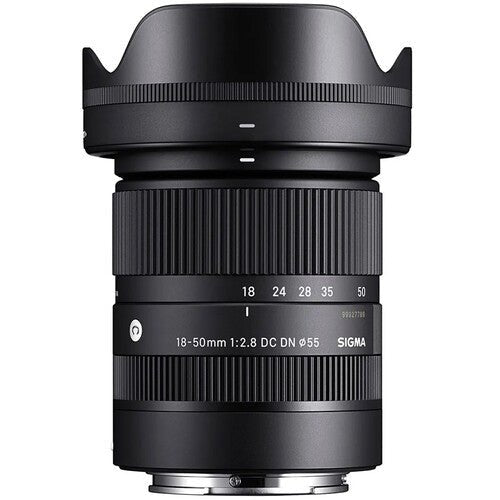Embarking on a photographic journey is like stepping into an endless world of creativity and inspiration. The excitement of capturing breathtaking landscapes, candid moments, and artistic expressions is usually enough to fuel our passion. However, we may run into hurdles that test our motivation. We've all experienced those moments when inspiration is nowhere to be found or when the weight of everyday life dims the spark of creativity. So, with that said, let's explore different ways to stay motivated and break free from those creative blocks!
How to Stay Motivated as a Photographer:
- Carry your camera everywhere
- Set personal projects
- Join photography communities
- Explore new locations
- Try different genres
- Learn from masters
- Attend workshops and seminars
- Document your progress
- Challenge yourself with 52-week projects
- Attend photography exhibitions
- Celebrate small wins
- Take breaks
- Get critiqued

Carry Your Camera Everywhere
Having your camera ready at all times allows you to take pictures instantly of those unexpected moments. Some of the most memorable photos are happy accidents, and having your camera ready ensures you never miss those lucky gems.
And inspiration can strike at any moment. With your camera nearby, you're prepared to capture whatever life throws at you.

Set Personal Projects
Creating photography projects that are personally meaningful and aligned with your interests and passions. Instead of relying on random snapshots or taking photos without a specific purpose, setting personal projects gives your photography a clear direction and focus.
- Pick a Project Theme: Choose a specific theme you're passionate about. Find something inspiring, like nature, wildlife, exploring a particular color scheme, or telling stories of people from different cultures.
- Set Goals: Set achievable goals and decide whether it's a short-term project with a defined end date or an ongoing one. Establishing goals will give you a sense of purpose.
- Do a lil' Research: Once you have a theme, research and plan how to approach the project. Scout locations, gather relevant information and consider the technical aspects of your photography.
- Stay Committed: Setting personal projects requires commitment. Make an effort to work on your project regularly, even if it's just a few minutes each day.
- Share Your Journey: Share your personal project with others, either through social media, a personal blog, or even in photography communities. Receiving feedback and encouragement from others can boost your motivation and provide fresh insights!
Related article: Photography Projects to Fuel Your Creativity

Join Photography Communities
Level up your photography game and connect with like-minded folks. Photography communities are a great way to find a diverse group of people, from beginners to seasoned pros. Look into Reddit, Facebook groups, forums, or even a dedicated website. These communities have so many discussions, photo challenges, and helpful advice. It's a chance to get inspired by others' work, learn new techniques, and exchange ideas with other photographers.

Explore New Locations
If you've been snapping away in the same old spots, it's time to shake things up and take a photography expedition to explore new locations! Forget the familiar scenes; look for breathtaking landscapes and quirky urban corners waiting to be framed. Wander through unexplored parks, hunt for hidden waterfalls, or stroll down bustling streets you've never seen before. The best part? Your lens will capture stories that are entirely fresh and unknown.

Try Different Genres
Just like trying various flavors of ice cream, exploring different genres lets you savor a new palette of artistic experiences. So, if you've been all about landscapes, switch things up and try street photography. Here's a list of some of the more popular photography genres.
- Landscape
- Portrait
- Wildlife
- Macro
- Architectural
- Fashion
- Sports
- Event/Concert
- Food
- Travel
- Astrophotography
- Black and White Scheme
- Documentary
- Still Life
- Long Exposure
- Experimental/Abstract
- Weddings
- Engagements
- Cars

Learn from Masters
Don't get intimidated – learning from the pros isn't about becoming a copycat. Instead, it's about tapping into wisdom and inspiration. By studying their techniques and approaches, you'll gain valuable insights into the art of photography. Look at other photographers' Instagram pages to also pull inspiration. Remember, it's not about replicating but about finding your own voice.

Attend Workshops and Seminars
Unlike staring at a screen, workshops offer hands-on learning experiences. You'll get to wield your camera, practice new techniques, and receive instant feedback from experienced mentors. Workshops and seminars are another way to get inspired by different perspectives.
Since photography is ever-evolving, with new gear, techniques, and trends popping up, workshops and seminars will keep you in the loop so you can take advantage of everything.
Workshops and seminars are usually centered around a specific topic, like portrait lighting or understanding the ins and outs of post-processing. So, it's a great way to improve any area you feel self-conscious about.

Document Your Progress
Create a visual diary of your photography journey by capturing every step you take towards greatness. Save all your photos; you'll be amazed at how far you've come. Not only does it boost your confidence and motivation, but it's also a fantastic learning tool.

Challenge Yourself with 52-Week Projects
Each week, choose a theme or concept to base your photo on. It could be anything – from reflections, patterns, contrasts, silhouettes, and everything. The beauty of this challenge lies in its variety; you'll be trying an array of subjects, styles, and techniques to push your creative boundaries.
The challenge ignites a spark of creativity like no other. Week by week, you'll brainstorm new ideas, experiment with compositions, and seek fresh perspectives to nail that perfect shot.
The best part is the camaraderie! Many photographers take on this challenge together, forming online communities or social media groups to share their weekly masterpieces, exchange tips, and cheer each other on.
Related article: Photography Projects to Fuel Your Creativity

Attend Photography Exhibitions
At photography exhibitions, you'll find yourself surrounded by diverse styles, subjects, and artistic expressions, leaving you in awe of the power of visual storytelling. You will witness the creativity of other photographers that can inspire a whirlwind of fresh ideas. Whether it's a unique composition, a creative use of light, or an innovative approach to storytelling, you'll leave the exhibition with a head full of newfound inspiration.
Photography exhibitions are also a great way to celebrate diversity, showcasing how each photographer brings their unique vision and voice to the medium. It reminds us that there's no right way to create art, encouraging us to embrace our individuality in our photography and motivating us to strive for excellence.

Celebrate Small Wins
It's time to celebrate every little victory along your photography journey – no win is too small, and every step counts! This tip is all about embracing a positive mindset and recognizing your progress, no matter how tiny it may seem.
Don't get flustered if you don't become an expert in a day. Photography has its ups and downs. And most of the time, progress might be gradual. Celebrating small wins lets you appreciate your progress, even if it's just a slight improvement in composition or nailing the exposure.
Related article: How Photography Helps Mental Health

Take Breaks
With all the hustle and bustle of capturing life's moments, remember the rejuvenating power of "Taking Breaks." Stepping away from your camera for a little while can be just what you need. Here are a few reasons why taking breaks is vital for your photography journey:
- Avoiding Burnout: Taking breaks prevents burnout, which can happen when you feel mentally and emotionally exhausted.
- Recharging Your Creative Batteries: Stepping away from photography lets you reload your inspiration and creativity.
- Gaining New Perspectives: Distance brings clarity. By taking breaks, you gain new perspectives on your work and ideas.
- Preventing Creative Blocks: Stepping away from photography releases the pressure and allows you to return with a fresh and invigorated perspective, ready to overcome any creative hurdles.
- Self-Care: Finally, taking breaks is an act of self-care. Nurturing yourself, mentally and emotionally, ensures you have the energy and passion to continue honing your craft.
Related article: How Photography Helps Mental Health

Get Critiqued
While it might seem daunting initially, embracing feedback from others can be incredibly beneficial for keeping you motivated as a photographer.
Critiques offer fresh perspectives on your work. Other photographers can point out elements you may have overlooked or suggest alternative approaches to your compositions, sparking new ideas and creative possibilities. Constructive feedback helps you identify your strengths and weaknesses, so you can focus on areas for improvement and refine your skills. And receiving critiques, whether positive or constructive, builds resilience. It helps you develop the ability to accept feedback graciously, learn from it, and use it to elevate your photography.
Positive critiques also count! They validate your progress as a photographer. Hearing positive feedback on your growth and development boosts your confidence and reinforces that your efforts are paying off.
Critiquing is not about judgment or comparison; it's about fostering growth and supporting each other's artistic journeys. Embrace feedback with an open mind and a willingness to learn.
Related article: How to Deal with Criticism as a Photographer
Embrace curiosity, celebrate progress, and fearlessly explore new horizons! Remember that the heart of photography lies in sharing stories, connecting with others, and finding beauty in the everyday.
Related article: Three Quirky Camera Techniques to Stimulate Your Imagination
Related article: Photography Projects to Fuel Your Creativity
Related article: How to Use Color Theory to Create Visually Pleasing Images?
Related article: Experimental Photography: What Does it Really Mean?
Related article: How to Use Prism Photography to Create Creative and Abstract Images?

